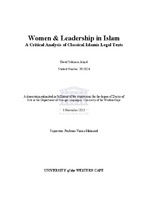| dc.description.abstract | The present research examines the post-formative Islamic legal literature surrounding the question of women’s leadership to gauge whether and to what extent the development of Islamic legislation pertaining to women was determined by genderattitudes prevalent in Muslim society. There are three main theories to explain the prevalence of Islamic legal rulings divesting women of leadership roles. The first is the traditional view that these rulings
are best explained by the application of the theoretical and hermeneutical approaches of classical Islamic legal theory to the Islamic source texts, the Qur’ān and Sunnah. The second is that the rulings are best explained as the consequence of the widespread gender attitudes in near-eastern society during the formative and early post-formative period of Islamic Law. The third is that legal inertia is the primary factor in explaining the existing post-formative Islamic legal corpus and little can be determined from it regarding the origin and early perpetuation of the laws. These competing theories are tested and explored by returning to a broad survey of Islamic legal texts from the four canonical schools of thought. The relevant passages from these texts are first translated and then examined according to three separate analytical approaches – a legal-hermeneutical analysis, an analysis of gender motifs, and a diachronic analysis of legal arguments – to explore the ways in which classical legal scholars arrived at and justified the prohibition of female leadership in politics, the judiciary, and congregational prayer.
Key | en_US |

